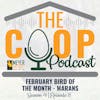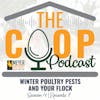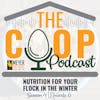Meyer Moment: Fall Predators
Let’s take a Meyer Moment to talk about Fall predators. Predator protection is paramount, to most chicken keepers at any point in the year, but each season brings its own concerns and predators. As the weather cools and leaves fall, keep your flock safe as you stay vigilant when Fall predators are on the hunt.
Important Links:
Hey everyone! Welcome back to The Coop with Meyer Hatchery - where we talk all things poultry in hopes of inspiring crazy chicken keepers and educating future flock owners. Each week we like to take a Meyer Moment to cover relevant happenings.
Let’s take a Meyer Moment to talk about Fall predators. Predator protection is paramount, to most chicken keepers at any point in the year, but each season brings its own concerns and predators. As the weather cools and leaves fall, keep your flock safe as you stay vigilant when Fall predators are on the hunt.
The local wildlife Spring babies are growing and learning to hunt, so you may notice the predator level in your area grow and expand. As winter nears and food sources become scarce, raccoons, foxes, weasels, coyotes, bobcats, bears, and aerial predators are all on the hunt for delicious, reliable food for winter.
As the leaves fall, the shade of trees no longer offers ideal protection from aerial predators. Hawks, Falcons, Owls, and Eagles can easily spot a tasty chicken from their perch and swoop in for a meal. To deter aerial predators, adding moving or shiny objects to trees or hangers can obstruct their line of sight. Nite Guard Repellent Tape, CD’s, flags, or any garden decor that spins will alarm any bird as they get closer to their ground prey.
Adding decoys can also help deter aerial predators as they respect the hunting rounds of larger birds. Decoys of owls and even scarecrows can help ward off aerial predators, and they work best when regularly moved around. Birds of prey are smart and will quickly notice if they have no reason to be scared of stationary objects.
Most Fall predators prefer to hunt at night or very early in the morning, so secure coops are a must. Locking those chickens up for the night in a safe coop is the best defense against the wildlife sniffing around your flock. Locks and latches on doors, hardware cloth covering any windows or vents, and a dig-proof floor can deter even the most determined pest.
For those of us who prefer extra convenience when it comes to chicken-keeping, an automatic chicken coop door opener can be a life-saver, literally for your chickens. These automatic doors can be programmed to open at a designated time and keep your flock safe during the night and early morning hours.
Besides all the wildlife that wants to eat your chickens, there are also pests that are happy to munch on the bounty of your eggs! Possums, snakes, and skunks will usually leave full-grown chickens alone but cannot resist a nest full of eggs. You may notice broken eggs shells in the nest, missing eggs, and even a stench if a skunk is to blame. Collect eggs early and often throughout the day to keep the temptation of eggs at bay, and keep that coop secure!
We hope you enjoyed this Meyer Moment about Fall predators and the best defenses to keep your flock safe during this beautiful season.
Enjoy the rest of your week and as always, thank you for listening to The Coop!
New to The Coop with Meyer Hatchery?
Listen to some of our favorite episodes!












